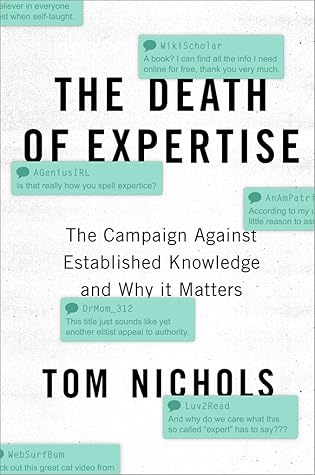More on this book
Community
Kindle Notes & Highlights
Read between
April 1 - May 1, 2018
Principled, informed arguments are a sign of intellectual health and vitality in a democracy.
Not only do increasing numbers of laypeople lack basic knowledge, they reject fundamental rules of evidence and refuse to learn how to make a logical argument. In doing so, they risk throwing away centuries of accumulated knowledge and undermining the practices and habits that allow us to develop new knowledge.
The death of expertise is not just a rejection of existing knowledge. It is fundamentally a rejection of science and dispassionate rationality, which are the foundations of modern civilization.
And yet the result has not been a greater respect for knowledge, but the growth of an irrational conviction among Americans that everyone is as smart as everyone else. This is the opposite of education, which should aim to make people, no matter how smart or accomplished they are, learners for the rest of their lives. Rather, we now live in a society where the acquisition of even a little learning is the endpoint, rather than the beginning, of education. And this is a dangerous thing.
Americans no longer distinguish the phrase “you’re wrong” from the phrase “you’re stupid.” To disagree is to disrespect. To correct another is to insult. And to refuse to acknowledge all views as worthy of consideration, no matter how fantastic or inane they are, is to be closed-minded.
Knowing things is not the same as understanding them. Comprehension is not the same thing as analysis. Expertise is a not a parlor game played with factoids.
The Dunning-Kruger Effect, in sum, means that the dumber you are, the more confident you are that you’re not actually dumb.
the least-competent people were the least likely to know they were wrong or to know that others were right, the most likely to try to fake it, and the least able to learn anything.
People simply do not understand numbers, risk, or probability, and few things can make discussion between experts and laypeople more frustrating than this “innumeracy,” as the mathematician John Allen Paulos memorably called it.
We are gripped by irrational fear rather than irrational optimism because confirmation bias is, in a way, a kind of survival mechanism.
When we fight confirmation bias, we’re trying to correct for a basic function—a feature, not a bug—of the human mind.
This is the set of steps that lead from a general question to a hypothesis, testing, and analysis.
the “law of parsimony,” meaning that the most likely explanation is the one that requires the fewest number of logical leaps or shaky assumptions.
Generalizations are probabilistic statements, based in observable facts.
That’s why one of the most important characteristics of an expert is the ability to remain dispassionate, even on the most controversial issues. Experts must treat everything from cancer to nuclear war as problems to be solved with detachment and objectivity.
the ability to examine new information and competing ideas dispassionately, logically, and without emotional or personal preconceptions.
It allows people to mimic intellectual accomplishment by indulging in an illusion of expertise provided by a limitless supply of facts.
The most obvious problem is that the freedom to post anything online floods the public square with bad information and half-baked thinking.
The Internet lets a billion flowers bloom, and most of them stink,
it ain’t what you don’t know that’ll hurt you, it’s what you do know that ain’t so.
Unfortunately, they’re shoveling against the tide. People do not come to the Internet so that their bad information can be corrected or their cherished theories disproven. Rather, they ask the electronic oracle to confirm them in their ignorance.
There is no way to enlighten people who believe they’ve gained a decade’s worth of knowledge because they’ve spent a morning with a search engine.
This unwillingness to hear out others not only makes us all more unpleasant with each other in general, but also makes us less able to think, to argue persuasively, and to accept correction when we’re wrong.
Alone in front of the keyboard but awash in websites, newsletters, and online groups dedicated to confirming any and every idea, the Internet has politically and intellectually mired millions of Americans in their own biases.
But science is a process, not a conclusion.
Education and credentials in one area do not guarantee expertise in all areas.
task is to explain, rather than to predict—
voters are often more interested in candidates and their personalities than in their ideas or policies.


